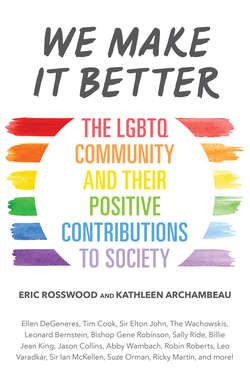Читать книгу We Make It Better - Eric Rosswood - Страница 27
На сайте Литреса книга снята с продажи.
ОглавлениеMany people know that Steve Jobs was the co-founder of Apple and the product visionary of the company, but did you know it was a gay man who turned their leading product, the iPhone, into one of the most successful tech products in history? Tim Cook became the CEO of Apple in 2011, and, three years later, became the first openly gay man to run a Fortune 500 company, after coming out of the closet in a Bloomberg editorial. As if that wasn’t enough, Apple became the first one-trillion-dollar publicly traded US company under his leadership.
Most of Apple’s profits have been driven by the iPhone, which tens of millions of Americans use in their everyday lives to make calls, send texts, take pictures, check email, listen to music, post on social media, play games, and more. Cook used the product to take high-tech security features normally only used by businesses and made them available to homes around the world. Ordinary people suddenly had the capability of unlocking their devices using fingerprint technology or by scanning their faces, something that was previously only seen in sci-fi movies. He also revolutionized the way consumers make purchases when Apple rolled out a digital wallet, giving people the ability to replace their credit cards with their phones when making in-person purchases.
In addition to being a leader in the business and technology fields, Cook is also a leader when it comes to social issues, and has a long history of supporting LGBTQ equality. In 2013, he wrote an opinion piece in the Wall Street Journal, urging the US Senate to pass the Employment Non-Discrimination Act (ENDA), a bill that would ban employment discrimination based on sexual orientation and/or gender identity. In 2015, he pushed even harder for LGBTQ equality. He wrote an op-ed in the Washington Post against “religious freedom” bills (laws that would legalize discrimination against LGBTQ people if done for religious reasons), wrote a statement to the Human Rights Campaign in support of the Equality Act (a bill that would provide protections from discrimination for LGBTQ people in employment, housing, credit, education, and other key areas of life), and he even got Apple to file a joint friend-of-the-court brief to the US Supreme Court, urging them to overturn same-sex marriage bans. When the court finally ruled that marriage equality was legal across the country, Cook celebrated by marching in the San Francisco Pride Parade with approximately eight thousand Apple employees.
Cook has also used his platform, and Apple’s position of influence in the world, to stand up on other social issues, such as racism, immigration, and climate change. For example, after the 2017 alt-right rally in Charlottesville, Virginia, that left one counterprotester dead and nineteen people injured, Cook pledged one million dollars in donations to both the Southern Poverty Law Center and the Anti-Defamation League. In 2017, Apple joined other companies in filing a joint court brief against Trump’s stringent Executive Order on Immigration, which halted entry of all refugees and banned citizens from seven predominantly Muslim nations. The companies all agreed that increased background checks were important, but so was America’s commitment to welcoming immigrants. The brief made the claim that “Immigrants do not take jobs away from US citizens—they create them,” while pointing out that immigrants or their children founded more than two hundred of the Fortune 500 companies, including Apple. In his role as CEO of the largest tech company in the world, Tim Cook has proved that LGBTQ people can be great business leaders. Ironically, even more than his stellar leadership, big heart, and generous financial contributions, Cook’s forthright example as the most recognizable gay person in the public eye is likely to have the most far-reaching impact on all youth, both queer and straight.
